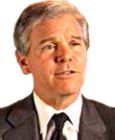Teamwork
MDs Under Pharmarchy: Cooperation or Resistance?
Which side are you on boy? Doctors choose under Pharmarchy.
Posted April 17, 2008
On Tuesday in the science section of the New York Times, long time reporter Gina Kolata interviews former chief editor of the New England Journal of Medicine, Jerome Kassirer about his views on doctors facing ethical dilemmas taking drug company money for research or expert speaking. Then she interviews three doctors who have chosen to no longer accept drug money and wonders whether this will be a growing trend in academic medicine.
On Wednesday, in the business section of the Times, Stephanie Saul, reports on an article that appears in this week's Journal of the American Medical Association on scientific journal articles ghostwritten by pharmaceutical industry hired writers then signed by doctor-leaders in the respective field of expertise. The article comes from legal documents obtained during the Vioxx trials and suggests that the practice is quite widespread. The doctors implicated offer weak defenses ("The fact that the draft was written by a Merck employee for later discussion does not in and of itself constitute ghostwriting"). The editor of JAMA that accepted one of the article was not so charitable, "I consider that being scammed."
Danny Carlat, a psychiatrist, who publishes an independent review of psychiatric drugs and therapeutics, The Carlat Newsletter, has been complaining about ghostwritten articles for a couple of years now and it's good that it is getting the attention in mainstream medical journals and newspapers.
What's at stake here apart from good or bad research is the hardwon credibility of doctors as scientists and advocates for their patients. One hundred years ago in this country doctors were considered little more than hucksters for various patent medicines and many neer do well sons of rich scions were sent off to medical school where diplomas could be bought. The professional self-reform efforts led by William Welch of Johns Hopkins and the effects of Flexner Report on medical education created a firewall between the drug companies of old and the medical education of new doctors that was strongly based upon the German/European model of the time. Doctors once again are on the verge of losing their credibility, after nearly 30 years of the Bayh-Dole act passed during the Reagan administration which encouraged financial ties between industry and medical academia.
I have never received money from drug companies but twenty years ago I worked briefly for a start up venture capital firm out to develop educational toys and programs for toddlers to five years old children. I was on the science board and it was my job to vet the product but especially manage the very aggressive marketing set up for these products. I remember saying "You can't say this. You can't say that. Okay you can say this." I often felt that if there was any way I could stretch what I believed to be true to cover what the marketers wanted to say I would try. It was natural. They were paying me. I wanted to help. There were stock options. I wouldn't lie but short of lying if there was some version of the truth that would work I would allow the marketers their version. P.S., the product line failed in part because the marketing never clicked.
I'm neither angel nor devil but I believe that process that worked on me works on all doctors taking money from drug companies today. One doctor in the article said things have changed from 20 years ago. I agree, 20 years ago the doctors had more control (interestingly when the profession separated 100 years ago the drug companies became quite beholden to the doctors). Now we live in a Pharmarchy so any doctor on the Pharma dole faces ethical challenges and scrutiny. The doctors who choose to turn down drug money decided it was no longer worth it to them. Unless, the bulk of my profession makes the same choice, the image and credibility of doctors in our country will inevitably fall.


